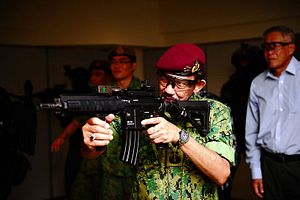On March 10, Brunei’s defense ministry officially confirmed the country’s new proposed defense budget for this year. Though the budget allocation does amount to a double-digit hike over the previous year, that hike is worth keeping in perspective given previous drastic cuts to the defense budget as well as lingering economic challenges that the Southeast Asian state continues to face.
As I have noted before, Brunei’s defense budget has come under growing strain over the past few years due to broader economic challenges. The tiny, oil-rich sultanate is highly dependent on the energy sector – with oil and gas accounting for over 70 percent of the country’s nominal GDP and almost all of its exports, by one estimate. Declining energy prices have put pressure on government finances, resulting in rising deficits and multiple years of negative growth. The defense budget has been significantly affected, with more modest increases and some large double-digit cuts.
Last week, Brunei’s defense ministry confirmed that the country’s defense budget had been set at just over 492.75 million Brunei dollars (US$375 million). The new figure constitutes an increase of about 12.9 percent over the previous year. And in his remarks to Brunei’s 14th Legislative Council, Brunei’s Minister of Defense II, Pehin Datu Lailaraja Major General (Rtd) Dato Paduka Seri Haji Awang Halbi bin Haji Mohd Yussof, eloquently reiterated the importance of defense in terms of the country’s broader goals, including preserving the country’s security and achieving its much-ballyhooed Wawasan 2035 vision.
Yet the hike ought to be kept in perspective. The BN$492.75 million figure is an increase from the previous year but still remains far below the BN$719.15 million figure from 2014 before a couple of drastic cuts. A major cut in 2015 of around 25 percent was followed by a modest increase and then another drastic 20 percent cut the following year. And as I hinted at above, the increasing pressures on the defense budget were also not all visible in terms of an observed decrease in numbers, thanks to shifts in components of the budget and other workarounds.
Of course, this is not to suggest that this year’s modest increase does not represent a gain or sorts, or that we are seeing a complete overhaul of Brunei’s defense priorities. Indeed, the seven areas that the minister mentioned in his remarks – protecting its territorial integrity; preserving a high level of preparedness and readiness; supporting a “whole of nation” approach; conducting effective defense diplomacy; involvement in international missions; sustaining high standards in terms of human resource capacity; and maintaining a respectable and credible image for the country’s defense organization – were quite familiar.
But it is to reinforce the point that the real question, as ever, remains the extent to which Brunei is able to attain these priorities and what tradeoffs it will need to make to ensure that this occurs. The answers to that question have more to do with individual decisions Brunei makes on its own and with its partners, rather than just a statistic about the rises and falls in its defense budgets.





























